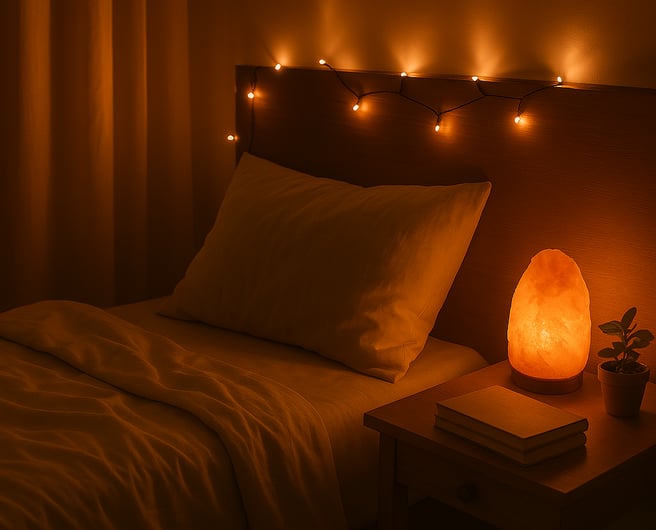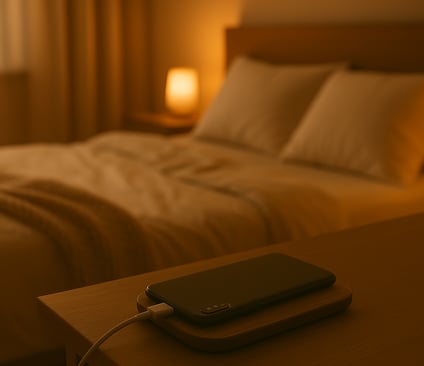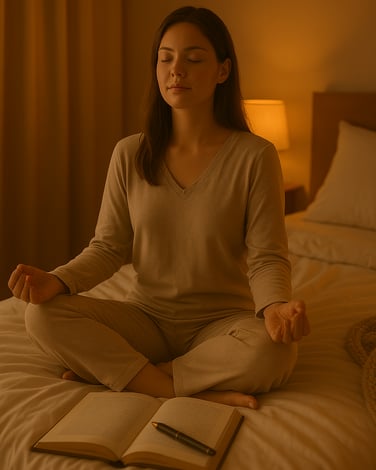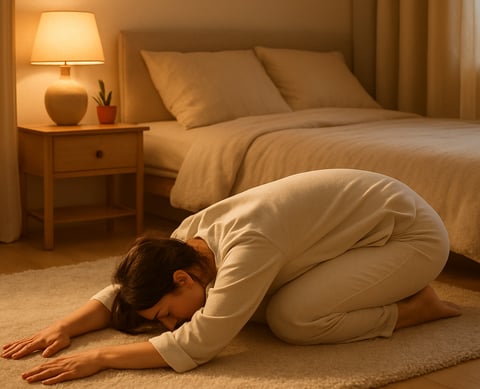Discover wellness ebooks at special prices!
10 Science-Backed Bedtime Rituals for Restful Sleep
Transform your nights with these 10 science-backed bedtime rituals that calm your mind and prepare your body for deep, restorative sleep. Discover effective breathing techniques and gentle self-tal...
7/2/202514 min read


Written with love, from your big sister who's been there too
Hey Beautiful Soul,
I see you there, lying in bed at 2 AM, your mind spinning like a washing machine on the fritz. Your body is exhausted, but your brain? Your brain is hosting its own private anxiety party, complete with a guest list of every worry, regret, and tomorrow's to-do items.
If this sounds familiar, take a deep breath. You're not broken. You're not alone. And you're definitely not the only one who's ever wondered why something as natural as sleep can feel so impossibly hard sometimes.
I've been exactly where you are. I've counted sheep until I was practically fluent in barnyard mathematics. I've tried everything from chamomile tea to meditation apps, from weighted blankets to white noise machines. Some things helped, others didn't, but through it all, I learned something important: the secret to better sleep isn't about finding the perfect hack—it's about creating a gentle bridge between your chaotic day and peaceful rest.
Today, I want to share what I've learned. Not as someone who has it all figured out (because let's be real, none of us do), but as your big sister who wants to wrap you in the softest blanket of understanding and give you the tools that actually work.
These aren't just tips—they're love letters to your nervous system. They're ways of saying "thank you" to your body for carrying you through another day. They're small acts of rebellion against a world that tells us we should be productive 24/7.
So grab your coziest blanket, maybe make yourself a cup of tea, and let's talk about how to give yourself the gift of truly restorative sleep.
1. Dim the Lights One Hour Before Bed: Your Body's Natural Sleep Signal.
Here's something that might surprise you: your body has been preparing for sleep since the sun went down, but our modern world has been sabotaging this ancient process. When we flood our homes with bright lights well into the evening, we're essentially telling our brains, "Hey, it's still daytime! Stay alert!"
The science is beautiful and simple: as darkness falls, your pineal gland starts producing melatonin, your body's natural sleep hormone. But bright lights—especially the blue light from our screens—can suppress this production by up to 90%.
What This Looks Like in Practice:
One hour before your ideal bedtime, start dimming the lights throughout your home. I'm not talking about sitting in complete darkness (though if that feels good, go for it). Instead, create what I like to call "sunset lighting."
Try these cozy alternatives:
Fairy lights strung around your bedroom
A salt lamp on your nightstand
Candles (safely placed, of course)
Lamps with warm-toned bulbs
Your phone's night mode or blue light filters
Big Sister Tip:
Make this transition gradual. Start with bright lights for dinner and household tasks, then around 8 PM (if you sleep at 10), switch to your warm, dim lighting. Your body will start getting the memo: "Oh, we're winding down now."
I remember the first time I tried this consistently. Within three days, I noticed I was naturally feeling sleepy earlier. It was like my body remembered how to prepare for sleep without me having to force it.
2. Take a Warm Shower or Bath with Intention: Washing Away the Day.
This isn't just about getting clean—though let's be honest, there's something satisfying about washing off the day's stress along with everything else. This is about creating a ritual that signals to every cell in your body: "The day is done. You are safe. You can rest now."
The magic happens in the temperature transition. When you step out of a warm shower or bath, your body temperature drops. This drop mimics what happens naturally when you fall asleep, essentially giving your body a head start on the sleep process.
How to Make It a Ritual:
Choose your scents mindfully:
Lavender for its proven calming properties
Chamomile for gentle relaxation
Eucalyptus for clearing your mind
Vanilla for comfort and warmth
While you're in the water:
Take slow, deep breaths
Let the steam envelop you like a warm hug
Imagine the water carrying away your stress, your worries, your need to be "on"
Say to yourself: "I am washing away what I don't need to carry into tomorrow"
Big Sister Reminder:
You deserve this softness. You deserve to treat your body with the same tenderness you'd show a beloved friend. There's no rush here—take your time. Let the warm water remind you that rest isn't earned; it's a birthright.
3. Put Your Phone to Bed Before You Do: Digital Boundaries for Better Sleep
I know, I know. This one might make you want to stop reading. But hear me out—I'm not going to tell you to throw your phone in a drawer and never look at it again. I'm going to tell you why this boundary might be the most loving thing you can do for yourself.
When we scroll before bed, we're essentially inviting the entire world into our most private, vulnerable space. Every notification, every upsetting news story, every comparison-inducing social media post—it all comes with us under the covers.
The Real Cost of Bedtime Scrolling:
Your brain processes everything you see and read as potential threats or opportunities. Even if you're just mindlessly scrolling through cute dog videos, your brain is still working, still processing, still staying alert. It's like trying to fall asleep while someone whispers a grocery list in your ear.
How to Create a Phone Bedtime:
Start small: Begin with just 15 minutes phone-free before bed. Gradually increase this until you reach at least 30 minutes.
Create a charging station: Place your phone charger somewhere other than your nightstand. This removes the temptation to "just check one more thing."
Replace the habit: Instead of scrolling, reach for:
A physical book
Your journal
A puzzle or adult coloring book
A meditation or breathing exercise
Big Sister Confession:
I used to be the worst at this. I'd tell myself I was just "checking the time" and then find myself an hour deep in a rabbit hole about celebrity gossip or world news. The first few nights were hard—I felt restless, almost bored. But then something beautiful happened: I rediscovered the quiet. I remembered what it felt like to be alone with my thoughts without immediately reaching for distraction.
4. Read Something Gentle: Food for Your Soul
Not all reading is created equal when it comes to bedtime. We're not talking about that thriller that has you flipping pages until 3 AM, or the work email that makes your stomach clench. We're talking about words that feel like a lullaby, content that soothes rather than stimulates.
What Counts as "Gentle Reading":
Poetry that speaks to your soul: Mary Oliver's observations about nature, Rupi Kaur's healing words, or Rumi's spiritual wisdom can be like meditation for your mind.
Comfort fiction: Think cozy mysteries, gentle romance, or that childhood favorite you could read with your eyes closed.
Spiritual or philosophical texts: Daily devotionals, books about mindfulness, or anything that connects you to something larger than your immediate worries.
Journals and memoirs: Stories of resilience, growth, and human connection can be deeply comforting.
Big Sister Tip:
Keep a special "bedtime book basket" next to your bed. Fill it only with books that make you feel peaceful, hopeful, or gently entertained. When you reach for reading material, you're not accidentally grabbing something that will wind you up instead of down.
I have a worn copy of "When Things Fall Apart" by Pema Chödrön that I return to again and again. Even reading just one page before bed reminds me that difficulty is temporary, that I'm not alone in my struggles, and that tomorrow is a new opportunity for peace.
5. Practice 3-Line Gratitude Journaling: Small Moments, Big Impact.
Before you roll your eyes and think "not another gratitude practice," let me tell you why this one is different. This isn't about forcing positivity or pretending everything is fine when it's not. This is about training your brain to notice the tiny sparks of light that exist even in difficult days.
Why This Works:
When we're stressed or anxious, our brains naturally focus on problems, threats, and what's wrong. This is evolutionary programming—our ancestors needed to spot dangers to survive. But in our modern world, this can keep us awake at night, replaying every small worry.
Gratitude journaling isn't about toxic positivity. It's about balance. It's about reminding your brain that alongside the challenges, there are also small moments of beauty, connection, and joy.
The Three Lines That Changed My Sleep:
Every night, I write down:
One moment that made me smile today (even if it was tiny—like my coffee being the perfect temperature, or a stranger's kind smile)
One thing I'm proud of myself for (this could be anything from "I got out of bed" to "I finished that project")
One thing I'm letting go of before bed (a worry, a mistake, a conversation I wish had gone differently)
Big Sister Truth:
Some nights, finding that one moment of joy feels impossible. On those nights, it's okay to write "I'm grateful I made it through today" or "I'm proud of myself for trying." The goal isn't perfection—it's presence. It's the gentle act of acknowledging both your struggles and your resilience.
6. Try 4-7-8 Breathing: Your Nervous System's Lullaby.
This breathing technique is like a magic spell for anxiety and racing thoughts. It's based on ancient pranayama practices and has been scientifically shown to activate your parasympathetic nervous system—the part of your nervous system responsible for rest and relaxation.
How 4-7-8 Breathing Works:
The extended exhale (the "8" count) is the key. When you exhale longer than you inhale, you trigger your vagus nerve, which sends a signal to your brain: "We're safe. We can relax now."
The Technique:
Inhale through your nose for 4 counts (let your belly expand, not just your chest)
Hold your breath for 7 counts (don't strain—this should feel comfortable)
Exhale through your mouth for 8 counts (make a soft "whoosh" sound if it helps)
Repeat 3-5 times
What to Expect:
The first few times might feel a little awkward or forced. That's completely normal. Your body is learning a new pattern. Some people feel lightheaded at first—if this happens, just breathe normally for a moment and then try again with gentler counts.
Big Sister Experience:
The first time I tried this, I was skeptical. But by the third round, I felt my shoulders drop away from my ears. My jaw unclenched. My racing thoughts slowed to a gentle hum. It was like my body was saying, "Oh, thank you. I've been waiting for permission to relax.
7. Write Out Your Worries and Close the Book: The Brain Dump.
Sometimes sleep won't come because your mind is like a computer with too many browser tabs open. Every worry, every "what if," every item on tomorrow's to-do list is running in the background, using up your mental energy.
The solution isn't to stop thinking—it's to give your thoughts a place to live outside of your head.
The Worry Dump Process:
Get everything out: Write down every single thing that's on your mind. Don't edit, don't organize, don't judge. Just empty your brain onto paper.
Worries about tomorrow
Things you forgot to do today
Conversations you need to have
Fears about the future
Random thoughts that keep popping up
Close the loop: When you're done writing, literally close the notebook or journal. This physical act signals to your brain that you've handled these thoughts for now.
Set a boundary: Tell yourself, "These worries are safe on paper. I don't need to carry them in my body tonight."
Advanced Tip:
If you find yourself lying in bed and remembering something you forgot to write down, keep a small notebook and pen by your bed. Quickly jot it down and then return to rest. Don't turn on lights or check your phone—just write in the dark if you need to.
Big Sister Reminder:
You don't have to solve everything tonight. You don't have to have all the answers. You just need to get the thoughts out of your head and onto paper, where they can wait patiently for tomorrow's attention.
8. Practice Gentle Self-Talk: Rewriting Your Inner Dialogue.
This might feel awkward at first, but stick with me. Many of us have been falling asleep to the sound of our inner critic for years. We replay our mistakes, worry about our inadequacies, and generally beat ourselves up right before we're supposed to rest.
What if instead of falling asleep to criticism, you fell asleep to kindness?
Mirror Affirmations That Actually Work:
Before bed, look at yourself in the mirror—really look. Not to judge or criticize, but to see yourself as you'd see a dear friend. Then say:
"You did your best today with what you had"
"It's okay to rest now"
"You're learning and growing, and that's enough"
"You're safe, you're loved, and you're allowed to take up space"
"Tomorrow is a new day, and you don't have to be perfect"
If Mirror Work Feels Too Intense:
Simply place your hand on your heart and speak these words internally. The physical touch activates your parasympathetic nervous system and adds a layer of self-compassion to the practice.
Big Sister Truth:
The first time I tried this, I cried. Not sad tears, but tears of recognition—like my heart was saying, "Finally, someone is being kind to me." Even if it feels strange at first, keep going. Your nervous system is listening, and it's hungry for this kind of gentle attention.
9. Gentle Movement: Releasing Physical Tension.
Our bodies hold stress in ways we don't always realize. That tightness in your shoulders from hunching over your computer, the tension in your jaw from a difficult conversation, the restless energy from a day of sitting—all of this can interfere with sleep.
Gentle movement before bed isn't about getting your heart rate up or breaking a sweat. It's about creating space in your body, releasing what you've been carrying, and preparing your muscles for rest.
Simple Stretches That Signal Sleep:
Child's Pose: Kneel on the floor, sit back on your heels, and fold forward with your arms extended. This pose naturally calms the nervous system and creates a sense of safety and introspection.
Legs Up the Wall: Lie on your back with your legs extended up against a wall. This gentle inversion helps reduce swelling, calms the nervous system, and feels incredibly restorative.
Gentle Spinal Twist: Lying on your back, hug your knees to your chest, then let them fall to one side while keeping your shoulders on the ground. Hold for 30 seconds, then switch sides.
Forward Fold: Standing or sitting, gently fold forward, letting your head hang heavy. This helps release tension in your neck and shoulders while creating an inward, reflective energy.
The Magic of Yoga Nidra:
If you're interested in taking relaxation deeper, try Yoga Nidra—often called "yogic sleep." It's a guided meditation that takes you through a systematic relaxation of your entire body. Many people find it so relaxing that they fall asleep during the practice, which is perfectly fine.
Big Sister Tip:
You don't need a yoga mat or special clothes. You can do these stretches on your bed, in your pajamas, in whatever way feels comfortable. The goal isn't perfect form—it's listening to your body and giving it what it needs.
10. Sip Something Warm: The Ritual of Comfort.
There's something deeply comforting about wrapping your hands around a warm mug, breathing in aromatic steam, and slowly sipping something soothing. This ritual engages multiple senses and creates a natural pause between the busyness of day and the stillness of night.
The Best Bedtime Teas:
Chamomile: Contains apigenin, a compound that binds to receptors in your brain that promote sleepiness and reduce anxiety. It's like a gentle hug for your nervous system.
Lavender: The scent alone can reduce stress hormones, and drinking lavender tea has been shown to improve sleep quality and reduce restlessness.
Valerian Root: A more potent option, valerian has been used for centuries as a natural sleep aid. Start with small amounts as it can be quite strong.
Passionflower: Helps calm anxiety and quiet racing thoughts, making it easier to settle into sleep.
Lemon Balm: Part of the mint family, lemon balm has a gentle sedative effect and can help with both anxiety and sleep.
Making It a Ritual:
Choose a special mug: Use your favorite cup—the one that feels good in your hands and makes you smile.
Create ceremony: Take time to boil the water mindfully, breathe in the tea's aroma, and sip slowly. This isn't just about the tea—it's about creating a moment of peace.
Set the scene: Dim the lights, maybe light a candle, and sit somewhere comfortable. Let this be a few minutes where you have nowhere to be and nothing to do except enjoy this simple pleasure.
Big Sister Confession:
I used to think bedtime tea was just for fancy people or those with too much time on their hands. But when I started drinking chamomile tea as part of my bedtime routine, I realized it wasn't about the tea itself—it was about giving myself permission to slow down, to have a moment of comfort, to end the day with something nurturing rather than urgent.
Putting It All Together: Your Personal Sleep Sanctuary
Here's the beautiful thing about these practices: you don't have to do all of them every night. Start with one or two that resonate with you. Notice how they make you feel. Add others gradually as they begin to feel natural and comforting.
Creating Your Personal Bedtime Ritual:
Start 1-2 hours before bed: Begin with dimming the lights and putting away your phone.
Choose 3-4 practices: Maybe it's a warm shower, some gentle stretches, gratitude journaling, and herbal tea. Or perhaps it's reading, breathing exercises, worry journaling, and self-compassion.
Make it yours: Adapt these suggestions to fit your life, your space, and your needs. Live in a studio apartment? Your ritual might be more compact. Have roommates? Focus on the practices that don't require complete silence.
Be patient with yourself: Some nights will be easier than others. Some practices will feel more natural than others. This is normal and okay.
Sample 30-Minute Bedtime Routine:
Minutes 1-5: Dim lights, put phone away, make herbal tea
Minutes 6-15: Warm shower or gentle stretches
Minutes 16-25: Reading or journaling (gratitude + worries)
Minutes 26-30: 4-7-8 breathing or gentle self-talk
Final Thoughts: You Deserve Rest
If no one has told you this today, let me be the first: you deserve rest. You deserve to sleep peacefully. You deserve to end each day with kindness toward yourself rather than criticism. You deserve to wake up feeling refreshed rather than exhausted.
Sleep isn't a luxury—it's a necessity. It's not lazy—it's essential. It's not something you have to earn—it's something you're worthy of simply by being human.
Your bedtime routine isn't just about getting better sleep (though that's wonderful too). It's about creating a daily practice of self-care, self-compassion, and self-respect. It's about saying to yourself, every single night: "You matter. Your wellbeing matters. You deserve to be cared for—especially by yourself."
Remember:
Start small—even one practice can make a difference
Be patient—new habits take time to feel natural
Adapt as needed—your routine should serve you, not stress you
Some nights will be harder than others—that's normal
You're not broken if sleep is difficult—you're human
Every small step toward better sleep is worth celebrating
A Gentle Challenge:
Tonight, choose just one practice from this list. Maybe it's dimming the lights an hour before bed. Maybe it's writing down three things you're grateful for. Maybe it's taking five deep breaths before you close your eyes.
Whatever you choose, do it with intention. Do it with kindness toward yourself. Do it as an act of self-love rather than self-improvement.
And remember—I'm here, cheering you on from afar. I believe in your ability to find peace, to rest well, and to wake up ready to meet each new day with hope and energy.
You've got this, and you're not alone.
Sweet dreams, beautiful soul.
With all my love and endless support, Your Big Sister 💕
P.S. - If you try any of these practices, I'd love to hear how they work for you. Remember, this is a journey, not a destination. Be gentle with yourself as you discover what helps you rest most peacefully.






















